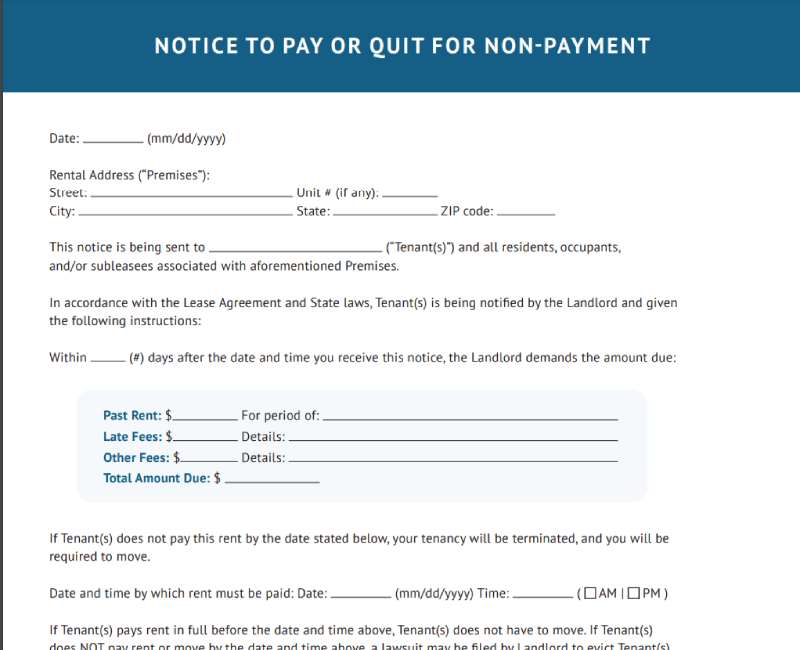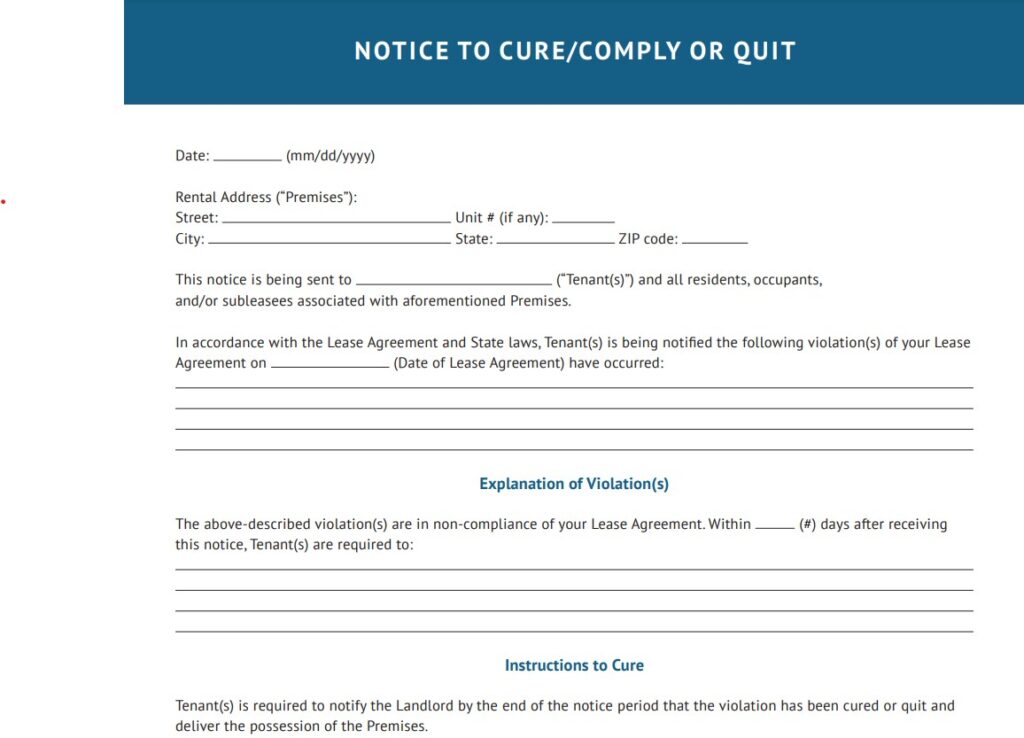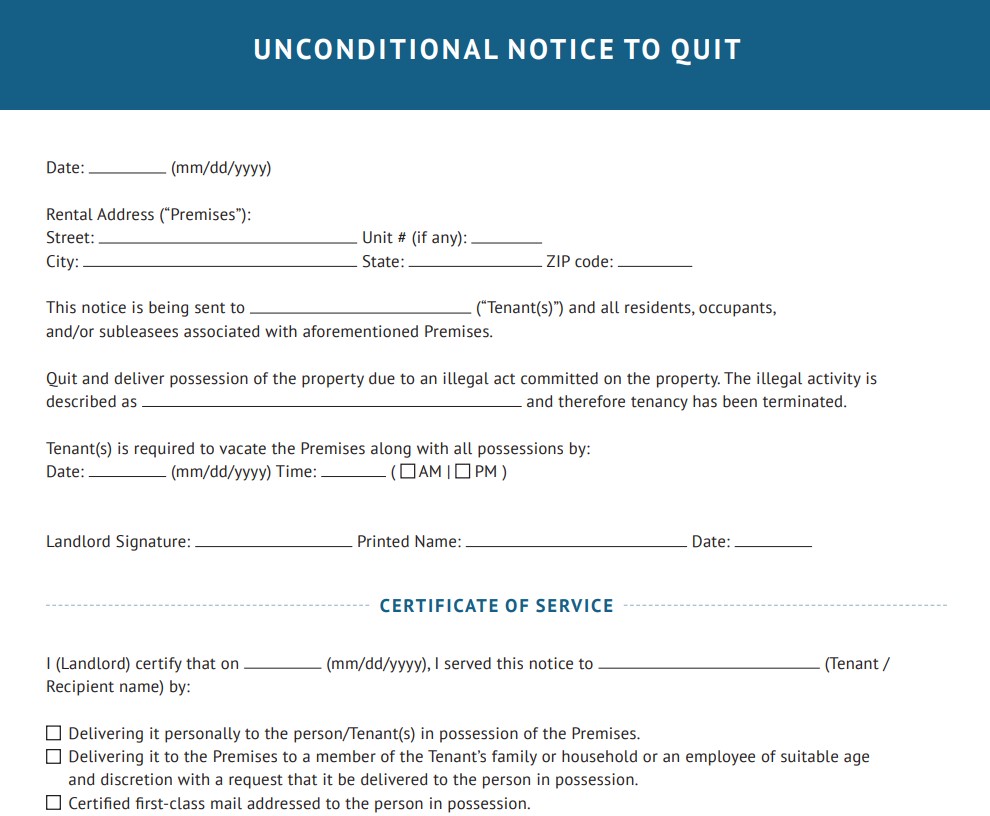Learning how to evict a tenant requires extensive research and understanding of the eviction process and laws. Landlords must follow the proper steps on how to evict someone from their property and have legal grounds to conduct eviction, such as tenants failing to pay rent or causing property damage. If landlords do not act quickly to evict a bad tenant, their property value may suffer due to lost rental income and damage caused by the tenant.
We’ll take an in-depth look at the proper steps on how to evict a tenant, how eviction works, and the fastest way to evict a tenant. Also, we provide tips on how you can protect yourself against bad tenants and tenant scams.
1. Learn Your State Landlord-Tenant Laws Related to Tenant Eviction
An eviction is a legal action to remove a tenant from a rental property. Landlord-tenant laws differ by state, regulating the process. Thus, landlords must go through the legal eviction process before evicting renters. Each state has its rules, but most require the tenant to be given a termination notice before filing an eviction lawsuit. If the landlord attempts to evict the tenant without a court order, the tenant may sue the landlord for damages.
For instance, landlords have the authority in New York to evict tenants for nonpayment of rent. After any applicable grace period, a landlord may give a tenant a 14-day notice to pay. In contrast, landlords in California must give the tenant three days’ pay or quit notice before beginning eviction proceedings to evict a tenant.
2. Refer to Lease Agreement & Decide on Grounds for Eviction
To proceed with eviction, you must have a valid reason to evict your tenant. This is an excellent time to review the tenant’s signed rental lease agreement and look for apparent violations. Some common grounds for eviction include the following:
- Failure to pay rent
- Consistent late payment of rent
- Staying after the lease has expired
- Property damage
- Disrupting other tenants
- Using the property for illegal activity
- Subletting without authorization
- The unit is being taken off the market
- Owner move-in
- Refusal to pay the legal rent increase

Document potential grounds for eviction. (Source: liveabout.com)
Make sure to record any violations with supporting documentation. Being as thorough as possible with this documentation is essential because you will need to use it as evidence in court. These records include images of the damages, printouts of email or text messages exchanged with the tenant, bank statements, or returned checks. Without evidence, it will be very difficult to prove your case and might prolong the eviction process.
3. Speak to & Reason With Tenants
Before sending a basic eviction notice, contact your tenants to discuss the current circumstances. Inform the tenant that the eviction process can be costly and may harm their credit if you sue for past rent or wage garnishment in small claims court. By doing this, they might be willing to vacate on their own accord without a contract, or they might be able to make up any past-due rent.

Explore alternatives, such as cash for keys agreement, to expedite the eviction process. (Source: Talkov Law)
However, if your tenants refuse to comply and you want the fastest way to evict someone without going through the long eviction process, consider offering them cash for keys. Cash for keys is an agreement entered into voluntarily by a landlord and tenant to exchange a set amount of money for the keys to a currently occupied property. If your tenants agree, create a lease termination agreement that they must sign and date. Also, ensure they fulfill their obligations under the contract and inspect the unit before handing over cash.
Check out our in-depth guide on Cash for Keys: How to Get Bad Tenants Out in 7 Steps (+ Quiz) to understand how this can be a better alternative to a time-consuming and expensive tenant eviction process.
4. Consult an Attorney
Once the legal system is involved, you must proceed with caution. Tenants have rights and protections that, if violated by you or any representatives acting on your behalf, could result in a serious lawsuit. There are also some complex evictions in which landlords will need the assistance of an attorney. These circumstances include when the tenant has a lawyer and is fighting the eviction, the tenant files for bankruptcy, the tenant is a member of a state-sponsored housing program, and when the tenant is also your employee.
Having an experienced landlord eviction attorney on your side will ensure that every action you take is within the bounds of the law. Furthermore, an attorney can assist and simplify the eviction process, prevent the recurrence of similar situations, and mediate talks with your tenants.
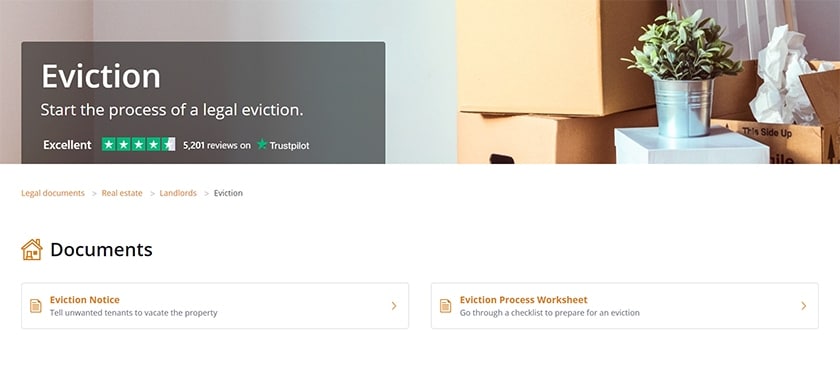
Rocket Lawyer’s eviction legal documents, advice, and guide (Source: Rocket Lawyer)
As you learn how to evict a tenant, check out Rocket Lawyer for its customizable legal documents and unlimited electronic signatures with RocketSign. Aside from reviewing the documents, lawyers from Rocket Lawyer can also offer a 30-minute phone call for consultations.
5. Give a Written Eviction Notice With Cause
The next step in the process is to make and send an eviction notice to the tenant. An eviction notice is a written request issued by a landlord to a tenant to vacate their rental property. Most eviction notices, like the pay or quit notice, give the tenant a chance to “cure” the situation by paying the overdue rent or stopping the lease violation. Otherwise, they will be subject to a formal eviction lawsuit.
But when the time on the eviction notice expires—from three to 30 days, depending on the state and the type of eviction notice—you can file a formal eviction with the housing court. After you win the eviction case, some states give the tenant up to 10 days to move. If the tenant refuses to leave, a sheriff may remove them and store their belongings at your expense.
Here are three types of eviction notices you can use and download, depending on the applicable jurisdiction of your case. Before using the documents below, check your local and state regulations to ensure you comply with the law on how to evict a tenant quickly.
6. Prepare Documents & Attend Court Hearing
Since landlords are prohibited from taking matters into their own hands and cannot physically remove a non-paying tenant from the property, your only resort is to file an eviction with the local housing court. Your attorney will handle all necessary paperwork, oversee the entire process, and defend you in court if the eviction goes to trial. If you represent yourself, you must have credible witnesses, evidence of tenant violations, and the lease agreement signed by you and the tenant.
Here are the items you’ll need to bring to housing court:
- The original lease agreement signed
- Records of payments, like a rent roll and bank statements
- Copies of your correspondence with the tenant
- Evidence of the tenant’s lease violation, such as photographs of excessive property damage or witness testimony that the tenant is causing problems to other occupants
- A copy of the eviction notice and proof of delivery
- Credible witnesses who can attest and testify to a tenant’s lease or law violations—it could be another building tenant, a superintendent or property manager, or a contractor or repair person

Prepare for court hearings with the help of your attorney. (Source: Think Realty)
Moreover, once you file the eviction, you will be assigned a court date on which your case will be heard. A court date is usually granted within 30 to 45 days of filing the eviction paperwork. It may take longer if there is a backlog or a holiday. Meanwhile, if you do not have an attorney, you should attend a few eviction proceedings in court to learn how the process works. Unless your case is heard early, you can expect to spend the entire day in court. You cannot choose where your case is assigned on the docket, so plan accordingly.
7. Evict the Tenant
The court can rule in either the tenant’s or your favor, or you may go to mediation to come to an agreement. If the judge rules in favor of the tenant and they owe unpaid rent, the judge will issue an order giving the tenant time to pay the overdue rent or face a new eviction.
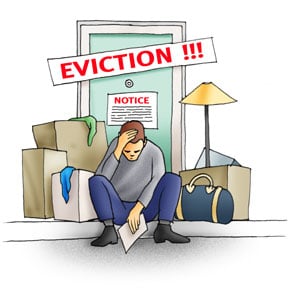
Tenants will vacate your property within one to two weeks. (Source: Template.net)
If the judge rules in your favor, the tenant should vacate your rental unit within a week or two. If the tenant does not leave voluntarily within seven to 10 days, you must serve a notice to vacate through the sheriff’s office. This notice usually gives the tenant 48 to 72 hours to leave, or they will be forcibly removed. The sheriff will not move the tenants’ belongings but will ensure they vacate the premises. You can change the door locks and reclaim your property once the tenant has left.
Tips to Protect Yourself Against Bad Tenants
Because the eviction process can cost you a lot of time, money, and stress, take precautions to avoid tenant scams and evade bad tenants. While you can’t always guarantee you’ll have good tenants, there are some things you can do to help prevent bad future tenants, starting with learning your state rental laws and screening your tenants.
Follow these tips to protect yourself from bad tenants and tenant scams in the future:
- Learn state guidelines: Each state has different laws regarding property rentals, so ensure you are familiar with yours. Understanding your state’s Fair Housing Act and landlord-tenant laws will guard you from tenant scams and treat your tenants correctly.
- Keep records and documents: Make sure to keep and track tenant records and documents like rent receipts, which include the tenant’s name, contact information, property address, date of receipt, and payment period and amount. These records will help you to keep detailed records, manage taxes and rent rolls, and assist when conflict occurs.
- Record property condition: Inspect the property with your tenant at the beginning and end of their lease to record existing and new damages. In addition, landlords need to be aware of the difference between normal wear and tear and damage to their property, and must use an apartment turnover checklist. This step will make it easier to protect yourself if a problem arises, like hiding property damage when moving out.
- Screen potential tenants: Thoroughly conduct the tenant screening process to ensure you put the best tenants in your units. Assess tenants’ credit and criminal history, eviction reports, and proof of income and employment. Ask for references and ratings from current and past employers and landlords.
Frequently Asked Questions (FAQs)
Some of these unlawful reasons you cannot use to ask a renter to vacate your property are the following:
- Discrimination eviction (racial, religious, familial, disability, or otherwise)
- Retaliatory eviction in response to tenant complaints or lawsuits
- Withholding payment of rent until a health or safety problem is resolved
- Eviction of protected tenant or classes
Yes, you can sue your landlord if you were unfairly evicted and served with an illegal eviction notice. But remember that you must prove your claims in a court of law. This means that you must have evidence of your landlord’s misconduct. Here are some of the things you can sue your landlord for, but are not limited to:
- Wrongful eviction
- Assault
- Battery
- Trespassing
- Libel
- Slander
- Intentional infliction of emotional distress
No, landlords cannot ask police officers to evict a renter on their behalf. Landlords still have to go through the eviction process to evict a tenant legally. The tenant is given time to leave the property after a court determines in favor of the landlord. The landlord may then request assistance from a law enforcement officer to evict the renter if the tenant refuses or fails to comply with the deadline.
Bottom Line
Almost every landlord will deal with a difficult tenant or eviction at some point in their career. That is why you must legally know how to evict someone from your rental property. Ensure you follow the proper steps on how to evict a tenant and don’t get into a legal bind. You should know your state’s landlord-tenant laws and understand your lease so that you can file a valid and legal eviction.
